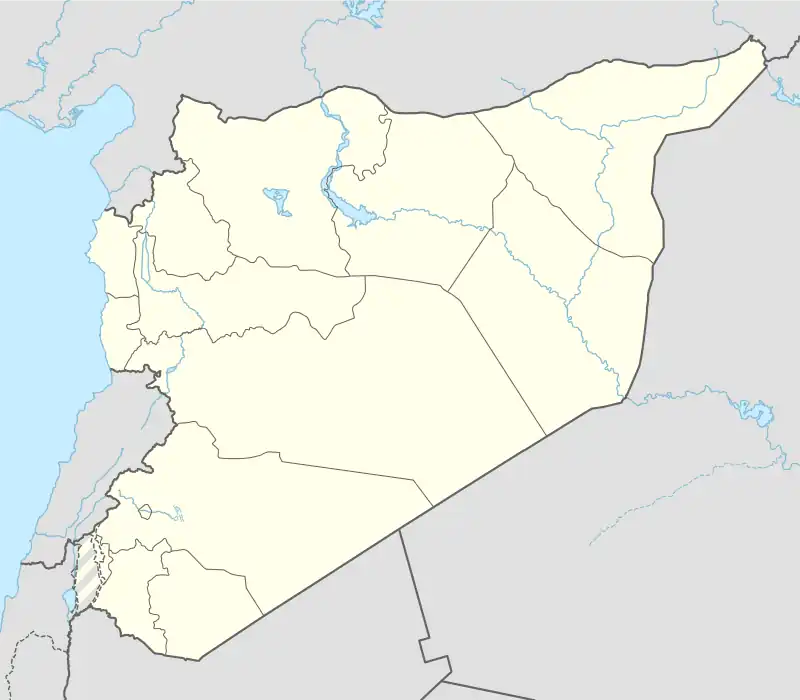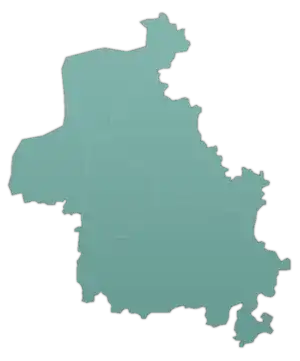Khan Shaykhun
Khan Shaykhun (Arabic: خَان شَيْخُون, romanized: Khān Shaykhūn) is a town in the Maarrat al-Nu'man District, within the southern Idlib Governorate of northwestern Syria.
Khan Shaykhun
خَان شَيْخُون | |
|---|---|
Town | |
 Khan Shaykhun Location in Syria | |
| Coordinates: 35°26′20″N 36°39′4″E | |
| Country | |
| Governorate | Idlib |
| District | Maarrat al-Nu'man |
| Subdistrict | Khan Shaykhun |
| Government | |
| • Mayor | Abdul Karim Najjar[1] |
| Elevation | 350 m (1,150 ft) |
| Population (2004) | |
| • Total | 34,371[2] |
| Time zone | UTC+3 (EET) |
| • Summer (DST) | UTC+2 (EEST) |
| Climate | BSk |
Khan Shaykhun is located at an altitude of 350 meters on the main highway between Aleppo and Damascus. The local economy is primarily agricultural, focusing on the growing of cotton and cereals.[3] The town was formerly known for producing embroidery.[4] Nearby localities include Hbit to the west, Kafr Zita to southwest, Murak to the south and Al-Tamanah to the east. In 2004, it was recorded as having 34,371 inhabitants.[2]
History
Khan Shaykhun takes its name from a 14th-century khan or caravanserai built by the Mamluk emir Sayf al-Din Shaykhu al-'Umari.[5][6] The town grew up around the khan and is situated below a prominent tell, where excavations carried out in 1930 under the French Comte du Mesnil du Buisson revealed evidence of habitation dating back to the 20th century BC.[3][7] The tell, which measures about 200–250 m long by 18–24 m high, was levelled off in the Bronze and Iron Ages to provide a platform for a series of walled towns built successively on top of each other. The second of these, dating to about 700 BC, has been identified as the Assyrian town of Ashkhani. The site was abandoned around 300 BC.[8]
In more recent times, Khan Shaykhun was noted for its beehive houses, an architectural style found across the Levant and probably exported from there to North Africa.[9] It was described in 1902 by the traveller Henry James Ross as "a miserable looking village"[10] and remained small until relatively recently. In 1966 it was recorded as having only around 3,000 inhabitants.[6]
Syrian Civil War
During the Syrian Civil War, the town initially fell under control of the Syrian opposition, and later, in 2014 fell to Jabhat al-Nusra.[11] In 2017, Deutsche Welle reported: "Idlib province, where Khan Sheikhun is located, is mostly controlled by the Tahrir al-Sham alliance, which is dominated by the Fateh al-Sham Front, formerly known as the al-Qaeda affiliated al-Nusra Front."[12]
On 4 April 2017, the town came under a heavy air attack, using chemical weapons.[13] 92 people were killed and several hundred injured.[14][15][16][17] After a few months of relative calm, the town was bombed again in September 2017.[18] Jets believed to belong to the Russian Air Force destroyed the town's power plant, which feeds northern Hama and southern Idlib.[19] The al-Rahma clinic was also struck.[20]
On 27 February 2018, pro-government media reported that Tahrir al-Sham withdrew from the city of Khan Shaykhun, and was expelled from western Aleppo by other rebel groups.[21] In mid-April 2018, pro-opposition media reported that Tahrir al-Sham once again seized the town, which had been devoid of rebel military presence.[22] In August 2018, the town again came under aerial bombardment by pro-government forces.[23][24] By 2019, almost all of the town's residents had abandoned it.[25]
On 19 August 2019, the Syrian Army was reported to have taken control of the city's eastern and northern districts.[26] The next day, the Syrian Observatory for Human Rights reported that rebel and Islamic factions and jihadi groups withdrew from Khan Shaykhun completely.[27] On 21 August, the Syrian army fully secured the town after capturing the strategic hill of Tell al-Tara and Al-Khazanat Camp in southern Idlib.[28][29]
External links
References
- "Roads in Khan Sheikhoun area in Idleb countryside rehabilitated". SANA. 13 June 2022. Retrieved 21 June 2022.
- "Khan Shaykhūn". citypopulation.de. Retrieved 2017-05-09.
- Cohen, Saul Bernard (1998). The Columbia Gazetteer of the World: A to G. Columbia University Press. ISBN 978-0-231-11040-2.
- Condra, Jill (2013). Encyclopedia of National Dress: Traditional Clothing Around the World. ABC-CLIO. p. 431. ISBN 978-0-313-37637-5.
- Nahrawālī, Muḥammad ibn Aḥmad; Blackburn, Richard (2005). Journey to the Sublime Porte: the Arabic memoir of a Sharifian agent's diplomatic mission to the Ottoman Imperial Court in the era of Suleyman the Magnificent; the relevant text from Quṭb al-Dīn al-Nahrawālī's al-Fawāʼid al-sanīyah fī al-riḥlah al-Madanīyah wa al-Rūmīyah. Orient-Institut. p. 93. ISBN 978-3-89913-441-4.
- Boulanger, Robert (1966). The Middle East: Lebanon, Syria, Jordan, Iraq, Iran. Hachette. p. 376.
- Du Buisson, "Une campagne de fouilles a Khan Sheikhoun", Syria 13 (1932)
- Ancient Egypt and the East. 1931. p. 63.
- Myers, Bernard Samuel (1959). Encyclopedia of world art. McGraw-Hill. p. 305. ISBN 9780070194663.
- Ross, Henry James (1902). Letters from the East. J. M. Dent & Company. p. 292.
- "Syrian Army violently disrupts al-Nusra meeting in Khan Shaykhun, Idlib Archived 2017-04-06 at the Wayback Machine". 3 May 2016. Al-Masdar News.
- "Death toll rises in Syria 'gas attack'". Deutsche Welle. 4 April 2017.
- "The Khan Sheikhoun Chemical Attack, The Evidence So Far - bellingcat". bellingcat. 2017-04-05. Retrieved 2017-04-08.
- Assad regime responsible for ‘awful’ Syria ‘chemical’ attack: EU’s Mogherini Al Arabiya. 4 April 2017. 5 April 2017.
- "An 'infantile argument': Experts pour cold water on Russia's 'fanciful' explanation for Syrian gas attack". Business Insider. Retrieved 2017-04-07.
- "Syria 'chemical attack': What we know". BBC News. 6 April 2017.
- Shaheen, Kareem (2017-04-06). "'The dead were wherever you looked': inside Syrian town after gas attack". The Guardian. ISSN 0261-3077. Retrieved 2017-04-07.
- Civil Defense: ‘Life at a complete standstill’ in Khan Sheikhoun after dozens of airstrikes in past week Archived 2017-09-28 at the Wayback Machine, Syria Direct, 25 September 2017
- Suleiman Al-Khalidi Russia, Syria intensify bombing of rebel-held Idlib, witnesses say, Reuters, 24 September 2017
- Hospital that treated Syrian chemical attack victims bombed in widespread air strikes, Telegraph, 22 September 2017
- "HTS withdraws from key city in southern Idlib". AMN - Al-Masdar News | المصدر نيوز. 2018-02-27. Archived from the original on 2020-01-30. Retrieved 2018-02-28.
- Dozens of medical facilities close in protest after rebel infighting damages Idlib hospital, SyriaDirect APR. 16, 2018
- Humanitarian situation in Syria remains worrisome: UN official : Xinhua 2018-08-29
- Syrian anti-air unit engage 'enemy target' as regime gears up for Idlib push, The National, August 11, 2018
- "Regime forces advance towards key town in northwest Syria". France 24. 2019-08-14. Retrieved 2019-08-14.
- "Syrian government forces march into Khan Sheikhoun in Idlib –..." Reuters. 2019-08-19. Retrieved 2019-08-19.
- "Fearing to fall in a complete siege, the factions and jihadi groups withdraw from Khan Shaykhun city and towns and villages south of it in the northern countryside of Hama". Syrian Observatory for Human Rights (in Arabic). 20 August 2019.
- "Syria regime forces take full control of key town — monitor". Jordan Times. 2019-08-21. Retrieved 2019-08-21.
- "Syrian regime forces take full control of key town". France 24. 2019-08-21. Retrieved 2019-08-21.

